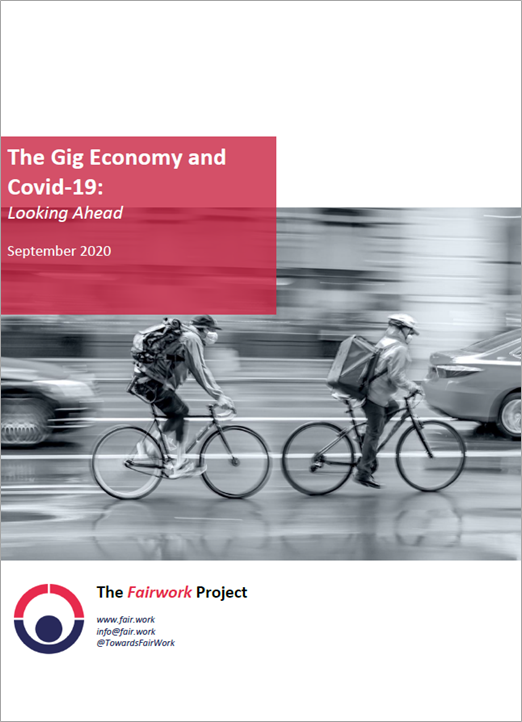In March 2020, we began investigating how gig economy platforms were responding to the Covid-19 pandemic. Reports indicated that half of gig workers had lost their jobs; those still working had lost two-thirds of their income on average; and many faced the impossible choice between penury and infection. As summed up by one worker: “either I’m starving or I’m dying of coronavirus.” As those who continued to work performed functions essential to society, the pandemic deepened the fracture lines of inequality: not just between gig workers and those who are currently better served by government support schemes, but also by placing additional pressures on the women, migrants, and minority-ethnic groups who form a core part of the gig workforce.
How are platforms responding? To investigate this, between March and April 2020, the Fairwork Foundation undertook a survey of platform policies, covering 120 platforms in 23 countries across Europe, North America, South America, Asia and Africa. We categorised platform responses according to the five Fairwork Principles that are used to rate platforms against decent work standards, namely: Fair Pay, Fair Conditions, Fair Contracts, Fair Management, and Fair Representation. The results were published in a report in April 2020.
Since then a lot has changed. As of September 2020, more than 31 million people have been infected, and almost one million have lost their lives to the virus. The financial, social, physical and psychological toll of the pandemic has been immense. We are entering into a period where not only government financial support schemes are ending, but also the relief packages and policies offered by the platforms and other private initiatives.
In order to track these changes, we present our findings based on 191 platforms in 43 countries across the world. Data for this report was collected through a combination of desk research and outreach to all of the platforms included in our survey. In particular, we expanded the research into low income and middle income countries to understand how gig workers have been affected in the absence of government relief schemes, and where platforms have faced a higher uncertainty of continuing their operations due to financial risks. Our top-line findings indicate that:
- Fair Pay: Pay was by far the most important issue for workers, yet 10 percent of the platforms surveyed provided pay loss compensation. Instead, platforms have tended to deflect responsibility to governments in order to avoid future liabilities.
- Fair Conditions 1 (Prevention): Contactless delivery is the most widespread policy in this category. However, contactless collection is notably less available. 60 percent of the platforms claimed to provide personal protective equipment (disinfectant or, less often, masks). However, workers often reported problems receiving any of that support.
- Fair Conditions 2 (Illness): Around half of the platforms were providing some payment for workers who were ill. When government financial relief packages were extended to include gig workers, some platforms shifted their focus on assisting the workers to access these schemes. However, the accessibility of these schemes (both government and platform) remains unknown.
- Fair Contracts: Most platforms have maintained that their workers are independent contractors and not employees, even while taking on more aspects of the role of an employer, such as sick pay provision. These positions are increasingly in conflict, as platforms acknowledge their responsibility for working conditions, despite the fact that their business models continue to rely on asserting the independence of their workers.
- Fair Management: Only a small fraction of platforms guarantee no loss of bonuses or incentive levels despite temporary deactivation of workers.
- Fair Representation: Gig workers around the world have been striking to demand better working conditions. However, there is no evidence of any meaningful platform engagement with worker associations and unions coordinating the strikes.
Download full article HERE




